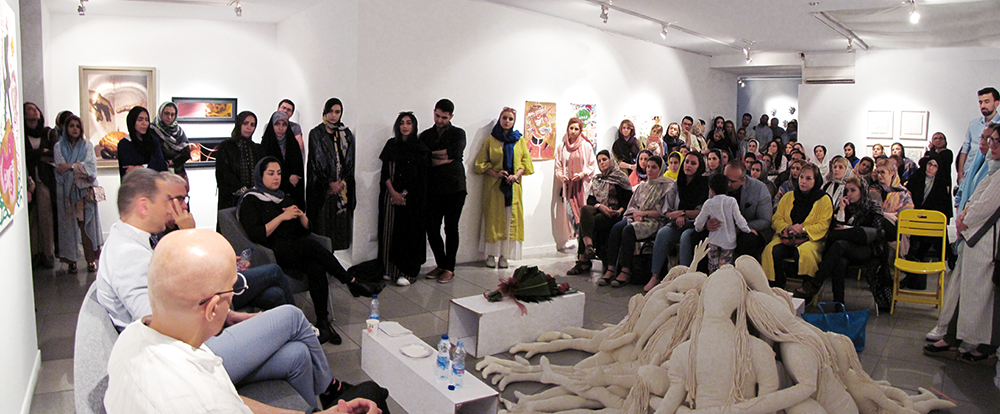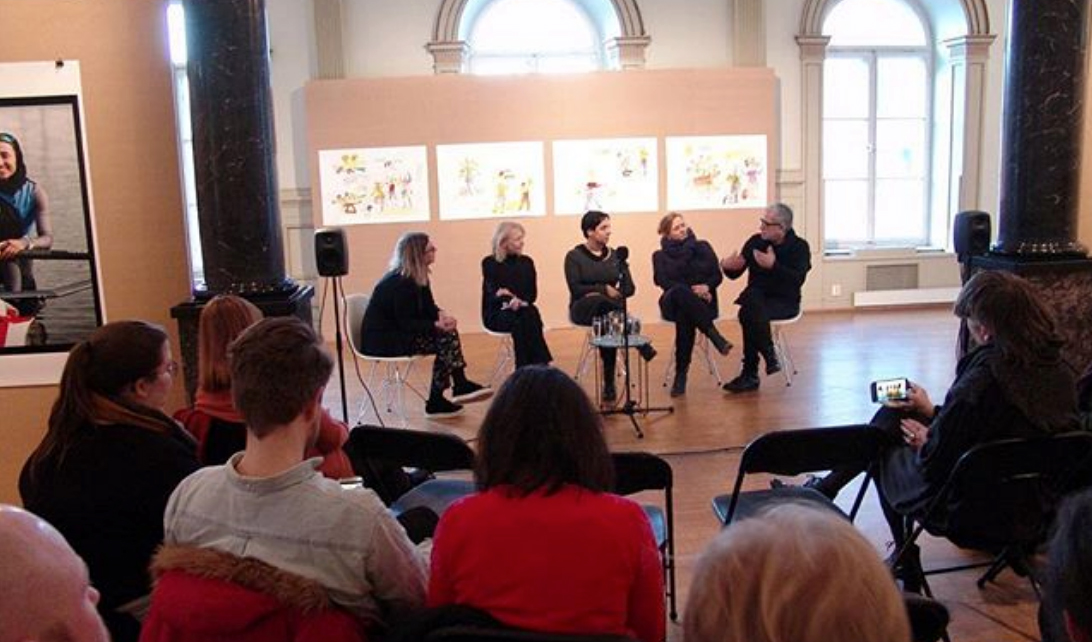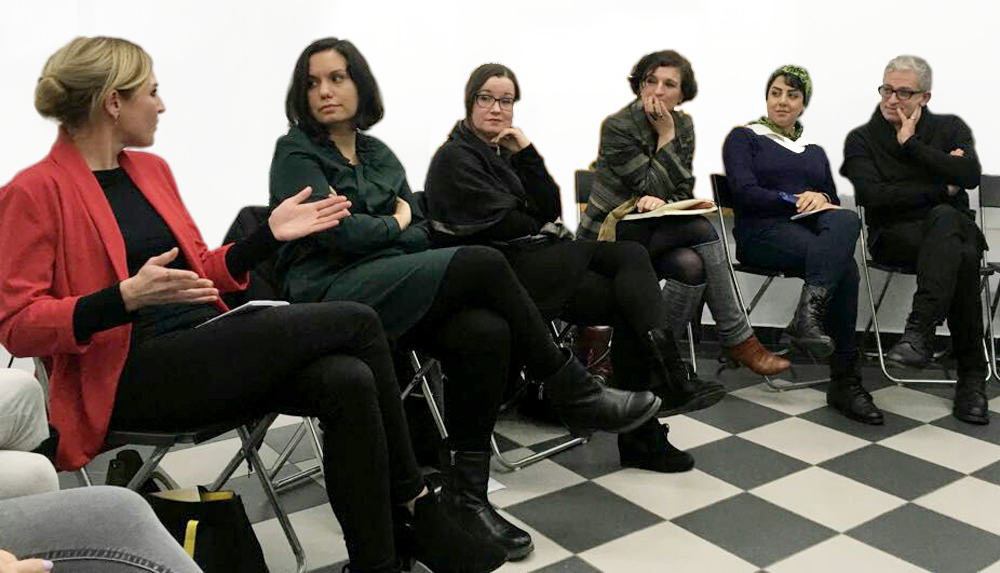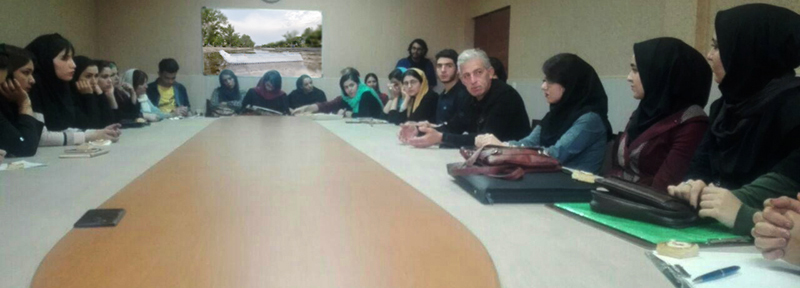Asieh Salimian: Panels, and Workshops
Panel Discussion - Probably Truth: Reflecting Individual and Social Identity in the Digital Revolution
Date: 30th Agust 2019
Location: Vista Art Gallery Tehran, Iran
A panel discussion took place on the topic of the "Probably Truth" exhibition, curated by Asieh Salimian. The exhibition aimed to explore the intersection of individual and social identity in relation to the ongoing digital revolution. The panel featured notable participants including Shahram Entekhabi, Dr. Ali Babaei Zad, Dr. Behnam Kamrani, and Asieh Salimian. Together, they engaged in a stimulating discussion about the exhibition and its thematic focus.
The panel discussion revolved around the "Probably Truth" exhibition, curated by Asieh Salimian, which delved into the complexities of individual and social identity within the context of the ongoing digital revolution. The exhibition aimed to capture the evolving relationship between the real and virtual worlds as a result of the electronic revolution, which began in 1990 and is expected to continue until around 2030.
Shahram Entekhabi, brought his unique artistic perspective to the discussion. He explored the transformative power of technology and its impact on individual and collective identities. Entekhabi's insights shed light on the ways in which artistic expressions can reflect and challenge the notions of truth in the digital era.
Dr. Ali Babaei Zad, an artist and psychology counselor, provided valuable insights into the psychological aspects of identity formation in the digital age. He discussed the influence of virtual spaces on self-perception, social interactions, and the construction of personal narratives. Dr. Babaei Zad's expertise contributed to a deeper understanding of the psychological implications of the digital revolution on individual identities.
Dr. Behnam Kamrani, an artist and art critic, offered a critical perspective on the exhibition and its thematic focus. He analyzed the artworks and their conceptual frameworks, exploring the ways in which they engaged with the broader discourse surrounding the digital revolution. Dr. Kamrani's insights enriched the understanding of the artistic interpretations of individual and social identity within the digital landscape.
Asieh Salimian, the curator of the exhibition, provided valuable context and insights into the curation process. She shared her vision for the exhibition and the curatorial decisions that shaped its narrative. Salimian's expertise as a curator, coupled with her understanding of the digital revolution's impact on artistic practices, added depth to the panel discussion.
The panel discussion facilitated a dynamic exchange of ideas and perspectives, generating a nuanced understanding of the exhibition's thematic exploration. The diverse expertise of the participants contributed to a comprehensive examination of individual and social identity in the digital age, as reflected through artistic expressions.
Overall, the panel discussion on the "Probably Truth" exhibition provided a thought-provoking exploration of the intersection between individual and social identity and the digital revolution. The insights shared by Shahram Entekhabi, Dr. Ali Babaei Zad, Dr. Behnam Kamrani, and Asieh Salimian enriched the understanding of the exhibition's thematic focus and its broader implications. The discussion fostered critical engagement with the complex dynamics of identity formation and truth in the evolving digital landscape.
جلسه ی بحث و گفت و گو پیرامون موضوع نمایشگاه حقیقت محتمل" با حضور شهرام انتخابی، دکتر علی بابایی زاد، دکتر بهنام کامرانی و آسیه سلیمیان
تاریخ: 8 شهریور 1398
Panel Discussion - "Power Struggle: An Interdisciplinary Exploration of Self, Power, and Politics"
Date: 25th January 2019
Location: Mahe Mehr Gallery, Tehran
A panel discussion titled Power Struggle: An Interdisciplinary Exploration of Self, Power, and Politics took place at Mahe Mehr Gallery in Tehran. The panel was held in conjunction with the Power Struggle exhibition, curated by Asieh Salimian. The exhibition delved into the evolving dynamics of capitalism, media influence, and power structures that shape our society. The panel featured esteemed participants including Dr. Nayereh Tavakoli, Mehdi Tadayoni, Dr. Behnam Kamrani, Ramyar Manouchehrzadeh, and was moderated by Asieh Salimian.
The panel discussion focused on the themes explored in the Power Struggle exhibition curated by Asieh Salimian. The exhibition aimed to shed light on the new stage of evolutions within the capitalist system and its impacts on media influence, economic and political boundaries, and the imposition of production. The exhibition also addressed the transformation of culture, private and social structures, and the ways in which power dynamics shape our relationships.
Dr. Nayereh Tavakoli, a sociologist, contributed her expertise to the panel discussion. Her insights delved into the sociological aspects of power struggles, examining the interplay between individual agency and social structures. Tavakoli's contributions provided a deeper understanding of the power dynamics at play within societies and the implications for individual identities.
Mehdi Tadayoni, a researcher, author, and translator, offered his perspectives on the complex interconnections between power, politics, and self. Tadayoni's insights explored the ways in which power structures influence individuals' perceptions, behaviors, and social interactions. His contributions added depth to the discussion, highlighting the impact of power struggles on individual agency and autonomy.
Dr. Behnam Kamrani, an artist, provided a unique artistic perspective on the subject. Kamrani's insights delved into the ways in which artists engage with power dynamics in their work, challenging established norms and questioning existing power structures. His artistic lens enriched the conversation, fostering a deeper understanding of the role of art in reflecting and critiquing power dynamics.
Ramyar Manouchehrzadeh, an artist, contributed his artistic and experiential insights to the panel discussion. He explored the ways in which power struggles manifest in the everyday lives of individuals, particularly within the context of Iran's socio-political landscape. Manouchehrzadeh's contributions offered a personal perspective, grounding the discussion in lived experiences.
The panel discussion on Power Struggle: An Interdisciplinary Exploration of Self, Power, and Politics provided a platform for critical discourse and reflection. The diverse perspectives shared by Dr. Nayereh Tavakoli, Mehdi Tadayoni, Dr. Behnam Kamrani, and Ramyar Manouchehrzadeh deepened the understanding of power dynamics in contemporary society. Asieh Salimian's moderation ensured a fruitful discussion that encouraged attendees to reflect on the complexities of power struggles and their implications for the self and society.
نشست بینا رشته ای، پیرامون موضوع نمایشگاه هماوردی
خویش تن، قدرت، سیاست
با حضور: - دکتر نیره توکلی: مدیر گروه جامعه شناسیِ هنرِ انجمن جامعه شناسی ایران
- مهدی تدینی: پژوهشگر، مترجم و نویسنده در حوزه ی ایدئولوژی پژوهی - دکتر بهنام کامرانی: هنرمند، نویسنده و منتقد هنری، عضو هیئت علمی دانشگاه هنر - رامیار منوچهرزداه: هنرمند -
کیوریتور و مدراتور: آسیه سلیمیان
جمعه پنج بهمن هزار و سیصد و نود هفت
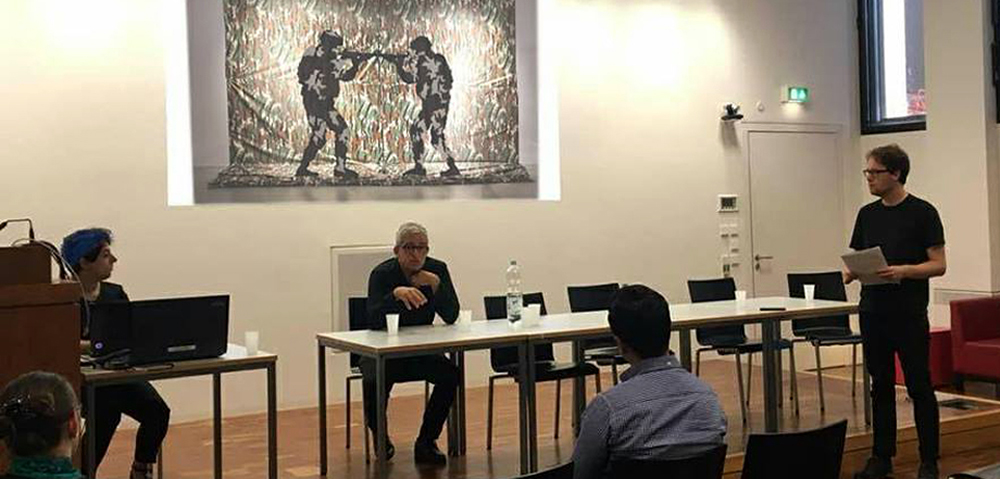
Talk on Contemporary Art in Tehran
With: Shahram Entekhabi and Asieh Salimian
Chair: Charlotte Bank
25th July 2018
Central and West Asia and Diasporas Research Network
Presentation of activities of the Factory TT platform.
Summary:
A recent talk on contemporary art in Tehran focused on the situation of emerging artists in Iran and shed light on the activities of the Factory TT platform. The talk addressed the challenges faced by emerging artists, including socio-political constraints and censorship. It highlighted Factory TT as a prominent art platform that supports and promotes emerging talents through various initiatives such as exhibitions, workshops, and residencies. The platform plays a crucial role in fostering dialogue between artists and curators, both locally and internationally, contributing significantly to the growth and recognition of Iranian contemporary art.
The talk provided valuable insights into the experiences of emerging artists in Iran and the intricacies of their artistic journey. The curators emphasized the challenges posed by socio-political constraints and censorship, which often impact the artistic expression and freedom of emerging artists. However, they also highlighted the resilience and creativity exhibited by these artists in navigating these obstacles.
One key aspect discussed during the talk was the significant role played by Factory TT. As a prominent art platform, Factory TT has emerged as a vital hub for emerging artists in Tehran. It actively supports and promotes their work through a range of activities, including exhibitions, workshops, and residencies. By providing a platform for artists to showcase their work, Factory TT enables them to reach a broader audience and gain recognition within the local and international art community.
The curators emphasized the significance of Factory TT in fostering dialogue and collaboration between artists and curators. The platform's initiatives create opportunities for artists to engage in critical discourse and expand their artistic horizons. Through exhibitions and cultural events organized by Factory TT, emerging artists are able to connect with a diverse range of audiences, fostering a deeper understanding and appreciation of Iranian contemporary art.
Moreover, Factory TT actively engages with the international art community, participating in art fairs, collaborations, and exhibitions abroad. This global outreach not only enhances the visibility of Iranian contemporary art but also challenges preconceived notions and stereotypes associated with the country. By promoting cross-cultural dialogue, Factory TT contributes to the growth and recognition of Iranian artists on a global scale.
Overall, the talk on contemporary art in Tehran provided a comprehensive understanding of the challenges and opportunities faced by emerging artists in Iran. It emphasized the vital role of Factory TT in supporting and promoting these artists, enabling them to overcome barriers and gain recognition. The activities of Factory TT contribute significantly to the growth and recognition of Iranian contemporary art, both within Iran and on the international stage.
پنل گفت و گو با شهرام انتخابی و آسیه سلیمیان
دردومین کنفرانس بین المللی دیاسپورا (جوامع دور از وطن) آسیای مرکزی و غربی (CWADRN). با شرکت دانشمندان ، نویسندگان ، فیلمسازان برجسته و هنرمندان با تخصص و تجربه مستقیمدر ارتباط با هنر معاصر و تاریخ در آسیای میانه و غربی. به میزبانی موسسه ادغام تجربی و تحقیقات مهارجان برلین (BIM) در دانشگاه هومبولت ، برلین ، و موسسه موناش آسیا.
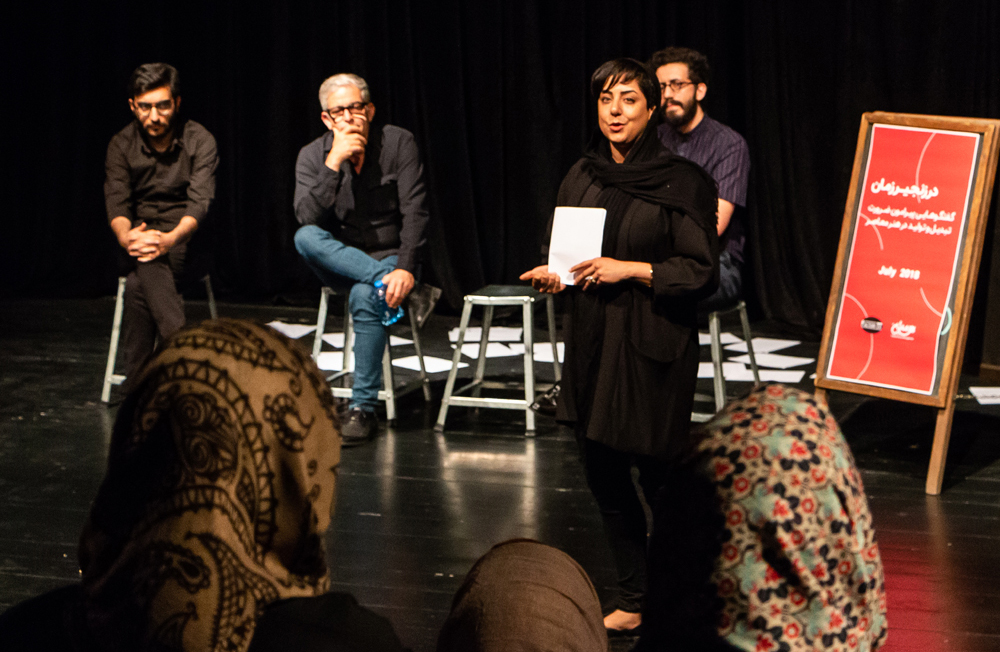
In the chains of time
Panel Discussion - "In the Chains of Time: Exploring Iran's Artistic Scene"
Tuesday 3 July 2018
Hamun Teather, Tehran, Iran
A panel discussion titled "In the Chains of Time: Exploring Iran's Artistic Scene" took place, featuring esteemed speakers including Asieh Salimian, Shahram Entekhabi, Zartosht Rahimi, and Seyed Ali Mirmohammadi from the Hamin Foundation. The panel focused on the necessity for transformation and production in Iranian contemporary art. Shahram Entekhabi delved into the realm of social performance in contemporary art, while Asieh Salimian shed light on the activities of FactoryTT. Seyed Ali Mir Mohammadi discussed the concept of support for art through the metaphor of a mask, and Zartosht Rahimi offered insights into the Iranian artist and art scene.
The panel discussion titled "In the Chains of Time: Exploring Iran's Artistic Scene" provided a platform for a profound exploration of Iranian contemporary art.
Shahram Entekhabi, an expert in contemporary art, focused his talk on the concept of social performance. He elaborated on how contemporary artists in Iran are utilizing performance art as a medium to address social issues, challenge norms, and engage audiences in a thought-provoking manner. Entekhabi's insights shed light on the transformative power of art and its ability to stimulate dialogue and change within society.
Asieh Salimian, curator, presented an overview of the activities undertaken by FactoryTT. She highlighted the platform's efforts in supporting and promoting emerging artists in Iran. FactoryTT serves as a dynamic space for exhibitions, workshops, and residencies, providing emerging talents with a nurturing environment to develop their artistic practices. Salimian's talk emphasized the importance of platforms like FactoryTT in fostering creativity and providing opportunities for artists to thrive.
Ali Mir Mohammadi delved into the complexities of the art world, where support may sometimes come with hidden agendas or limitations. Zartosht Rahimi, an expert on the Iranian artist and art scene, provided valuable insights into the local artistic landscape.
The panel discussion succeeded in offering a multifaceted exploration of Iranian contemporary art. The speakers' diverse perspectives and expertise provided attendees with a comprehensive understanding of the artistic scene in Iran. The discussions on social performance, the activities of FactoryTT, the concept of support for art, and the Iranian artist and art scene collectively enriched the dialogue surrounding contemporary art in Iran.
در زنجیر زمان: گفتگوهایی پیرامون ضرورت تبدیل و تولید در هنر معاصر
شهرام انتخابی: عملکرد اجتماعی در هنر معاصر
آسیه سلیمیان: فعالیت های کارخانه تبدیل و تولید
سید علی میر محمدی: نقابی به نام حمایت از هنر
زرتشت رحیمی: هنرمند و صحنه ی هنری ایران
Exploring Art, Politics, and Human Rights
2nd March 2018
KUNST HALL 3,14
Bergen, Norway
The panel discussion on Impacts on the Iran art scene today titled Exploring Art, Politics, and Human Rights took place, featuring Shahram Entekhabi and Asieh Salimian from Factory TT, Lise Rakner, a professor of comparative politics, Toril Hansen from PEN Vestlandet, and Malin Barth, the Director of Kunsthall 3.14. The discussion revolved around the intersection of art, politics, and human rights, providing valuable insights into the role of contemporary art in fostering critical dialogue and promoting human rights.
The panel discussion, Exploring Art, Politics, and Human Rights, brought together a diverse group of participants to delve into the complex relationship between art, politics, and human rights.
Shahram Entekhabi and Asieh Salimian, representing Factory TT, shared their experiences as curators and discussed the platform's endeavors in promoting contemporary art in Iran. They emphasized the power of art in challenging political structures, fostering dialogue, and advocating for human rights. Factory TT's activities in supporting emerging artists and providing a space for critical engagement were highlighted as significant contributions to the art scene in Iran.
Lise Rakner, a respected professor of comparative politics, brought her expertise in democratisation and human rights to the discussion. Rakner explored the role of art in challenging oppressive systems and advocating for democratic values. Her insights shed light on the potential of art to inspire social and political change, as well as the importance of protecting and promoting freedom of expression and human rights in artistic spaces.
Toril Hansen, representing PEN Vestlandet, contributed to the discussion by focusing on the importance of artistic freedom and the role of art in advancing human rights. PEN Vestlandet, a branch of the international organization PEN, promotes literature, freedom of expression, and the rights of writers and artists. Hansen's perspective emphasized the significance of creating safe spaces for artists to express themselves without fear of censorship or repression.
Malin Barth, the Director of Kunsthall 3.14, offered insights from the perspective of an art institution. She discussed the responsibility of art institutions in supporting artists who engage with political and human rights issues. Barth emphasized the need for collaboration and solidarity within the art community to amplify the voices of artists and create a more inclusive and just society.
The panel discussion facilitated a thought-provoking exchange of ideas, addressing the intricate connections between art, politics, and human rights. The diverse perspectives of the participants enriched the conversation, providing attendees with a comprehensive understanding of the challenges and opportunities in this realm.
ر
Overall, the panel discussion on "Exploring Art, Politics, and Human Rights" underscored the transformative power of contemporary art in challenging political systems, promoting human rights, and fostering critical dialogue. The contributions of Factory TT, PEN Vestlandet, and Kunsthall 3.14 were highlighted as essential in providing platforms for artists to express themselves freely and advocate for a more just and inclusive society. The discussion encouraged attendees to further explore the intersection of art, politics, and human rights and to engage in meaningful actions that support the rights of artists and promote social change.
بررسی زمینه های پیدایش اثرِ هنرمندان نوظهور ایرانی
کیوریتورها : شهرام انتخابی و آسیه سلیمیان
PEN Vestlandet تاثیر بر صحنه هنر امروز ایران
با حضور: تیم کیوریتورها شهرام انتخابی و آسیه سلیمیان – لیز راکنر، پروفسور دپارتمان سیاست تطبیقی دانشگاه برگن – توریل هانسن
مالین بارث، مدیر هنری موزه ی کونست هال ۳,۱۴, برگن
Panel Discussion - Contemporary Art Production in Iran and Beyond
Date: 11th January 2018
Location: Gallery Katharina Maria Raab, Berlin, Germany
Moderation: Shahram Entekhabi
The panel discussion titled Contemporary Art Production in Iran and Beyond took place at Gallery Katharina Maria Raab in Berlin, Germany. The panel featured participants including Julia Allerstorfer from the Institute for History and Theory of Art, KU Linz, Dr. Charlotte Bank from zakharif projects, A.S. Bruckstein Çoruh from ha'atelier/Taswir projects, Katrin Nahidi from FU Berlin, and Asieh Salimian representing Factory TT. The panel, moderated by Shahram Entekhabi, delved into the intricacies of contemporary art production in Iran and its broader implications.
The panel discussion on Contemporary Art Production in Iran and Beyond brought together esteemed participants to delve into the multifaceted aspects of art production in Iran, as well as its connections to the global art landscape.
Julia Allerstorfer, representing the Institute for History and Theory of Art, KU Linz, contributed her expertise to the discussion. Her insights shed light on the historical and theoretical perspectives that shape contemporary art production in Iran, offering a broader understanding of the cultural and artistic context in which it operates.
Dr. Charlotte Bank, representing zakharif projects, provided valuable insights into the contemporary art scene in Iran and its connections to the international art world. Her expertise in curatorial practices and project management enriched the discussion, highlighting the diverse approaches and collaborations that facilitate the production and exhibition of contemporary Iranian art.
A.S. Bruckstein Çoruh, representing ha'atelier/Taswir projects, offered a unique perspective on the intersection of art, culture, and identity. Çoruh's insights explored how contemporary art production in Iran engages with various artistic practices and visual languages, reflecting on themes of history, memory, and social dynamics.
Katrin Nahidi, from FU Berlin, contributed her academic expertise to the panel, focusing on the socio-political dimensions of contemporary art production in Iran. Her insights delved into the complexities of censorship, political restrictions, and the strategies employed by artists to navigate these challenges. Nahidi's contributions shed light on the resilience and creativity of artists in responding to the socio-political landscape.
Asieh Salimian, representing Factory TT, shared her experiences and discussed the role of the platform in supporting and promoting contemporary art production in Iran. Salimian's insights highlighted Factory TT's initiatives in providing a nurturing environment for emerging artists, fostering critical dialogue, and connecting Iranian artists with the international art community.
3 days of workshop on environmental art with the aim of getting more art into public places.
Tabdil / Tolid Workshop on Environmental Art
Date: 20th - 22nd April 2017
Location: Fadak Art and Culture Complex, Ardabil, Iran
From the 20th to the 22nd of April 2017, the Fadak Art and Culture Complex in Ardabil, Iran, hosted the Tabdil / Tolid Workshop on Environmental Art. Curated by Asieh Salimian and featuring artist Shahram Entekhabi, the three-day workshop aimed to encourage the integration of art into public spaces and address the pressing issue of climate change. Local artists participated, engaging in creative discussions and producing artworks inspired by environmental themes.
The Tabdil / Tolid Workshop on Environmental Art was held at the Fadak Art and Culture Complex in Ardabil, Iran, from the 20th to the 22nd of April 2017. Curated by Asieh Salimian and featuring artist Shahram Entekhabi, the workshop brought together a group of local artists interested in exploring the intersection of art and the environment.
Throughout the three-day workshop, participants engaged in lively discussions, interactive activities, and hands-on artistic exercises. The workshop aimed to inspire the integration of art into public spaces while raising awareness about climate change and its environmental impact.
Under the guidance of Asieh Salimian and Shahram Entekhabi, the participating artists delved into the complex relationship between art, nature, and the public sphere. They examined innovative approaches and techniques to express their concerns and visions regarding environmental issues through their artwork.
The Fadak Art and Culture Complex served as an inspiring venue for the workshop, providing ample space and resources for creative exploration. The artists were encouraged to think outside the box and push the boundaries of traditional artistic mediums and methods.
Over the course of the workshop, the participants developed a deeper understanding of the role of art in raising awareness and initiating conversations about climate change. They were inspired to create artworks that would have a lasting impact on the public, encouraging reflection and action.
The Tabdil / Tolid Workshop on Environmental Art successfully fostered a sense of collaboration and community among the local artists. By encouraging them to integrate their art into public spaces, the workshop aimed to create opportunities for meaningful engagement with the community and spark discussions about environmental challenges.
As a preparatory event for "The First Performance and Environmental Art Festival" in Ardabil, the workshop laid the foundation for thought-provoking and impactful artworks to be exhibited during the festival. It nurtured the participants' creativity, expanded their artistic perspectives, and highlighted the importance of addressing climate change through the power of art.
In conclusion, the Tabdil / Tolid Workshop on Environmental Art, curated by Asieh Salimian and featuring Shahram Entekhabi, was a significant event that brought local artists together to explore the intersection of art and the environment. The workshop provided a platform for creative expression, collaboration, and reflection on climate change. It set the stage for the upcoming festival, showcasing the potential of art to address pressing environmental issues and create a positive impact within the community.
